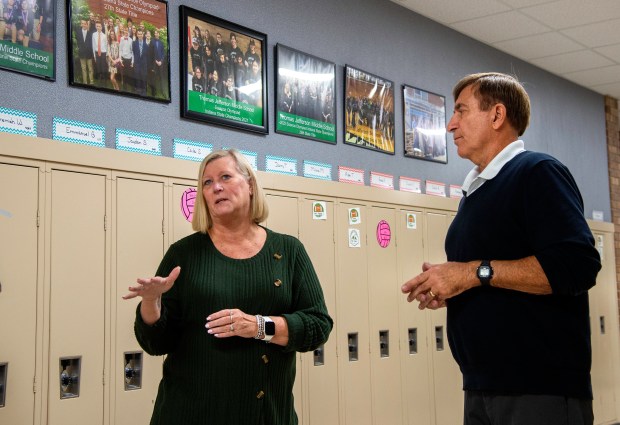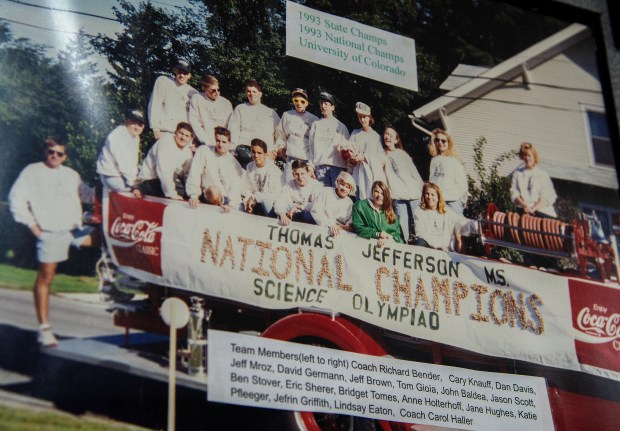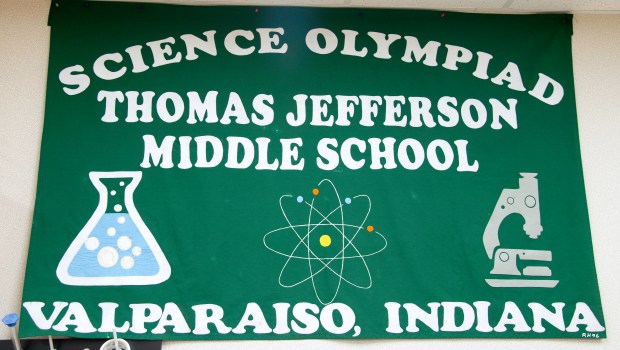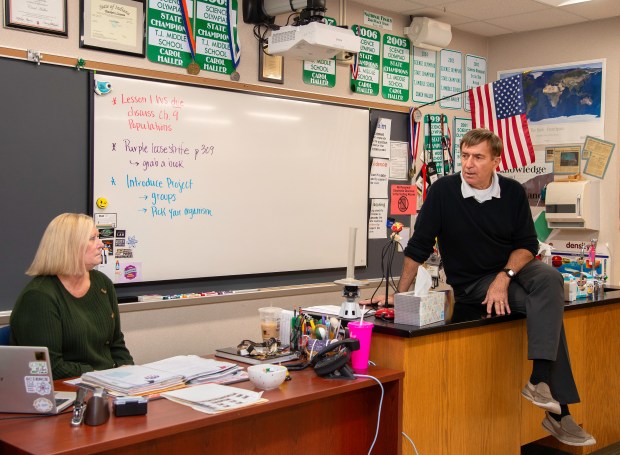Rich Bender is trying to rewire his brain.
The former Thomas Jefferson Science Olympiad co-coach, along with Carol Haller, has his late fall and early afternoon winters free for the first time since he graduated from college.
They are no longer tethered to their study lab, strategizing about events like “Helicopter” and “Write It Do It.”
The endless stream of practices for six months, every day after school from 3 to 4:30 p.m., and on Saturdays from 10 a.m. to 2:30 p.m. for six months, are over.
Bender and Haller retired from coaching Science Olympiad this fall. The two middle school teachers made science cool and hip, turning it into a noncontact sport for a generation of science and math nerds.
They talk about unbreakable records in sports.
Reds baseball star Pete Rose’s 56-game hitting streak. The NFL’s Tampa Bay Buccaneers 56-game losing streak. UCLA’s seven straight National Championships in college basketball.
Here’s one for Indiana.
Thirty-one straight Science Olympiad State titles and two National Titles. TJ hasn’t finished second in state since 2008. Bender and Haller will forever be the Mount Rushmore of Science Olympiad Middle School coaches. TJ finished first nationally in 1993 and 1996.
“It’s something I have to adjust to,” Bender said of the big chunk of time he has free now.
Their retirement was somewhat unexpected. Haller stepped down in May because of health issues.
Bender was going to keep coaching but decided during the summer that it’d be hard to keep the standard up without Haller. Kate Sanders, a former SO team member, is coaching the program now.
“It’s definitely less stressful,” Haller said of not coaching. “I do miss the kids.”
Science Olympiad, which started in 1983, is like a track meet.
There are three official competitions that feature 23 events: Regionals, State and Nationals.
Fifteen kids compete for medals in events like Optics and Wind Power. Some might spend hours building a helicopter. Others memorizing thousands of fossils.

Bender was the mad scientist coach, mixing and matching kids with the right events, motivating them and pressing his case with the judges when hiccups arose on game day.
Haller took care of all the details. She booked the hotel rooms for the competitions, made sure the kids always had food and snacks, took care of the travel arrangements and did a fair share of coaching.
The sports analogy is apt for Bender and Haller.
They coached their students like athletes. They set expectations and created a culture that fostered teamwork and the pursuit of excellence.
Through the process, the Bender-Haller combination touched the lives of hundreds of kids, many of whom became doctors, engineers, teachers and lawyers.
Matt Gavelek is the quintessential Science Olympiad alumni. He was on the 2000 team that finished second nationally. Gavelek finished first at the national competition in “Bridges.”

He transferred from Washington Township and spent his first year as an alternate. Gavelek said coming in as an outsider was difficult. The competition was intense and the talent pool was deep but he was determined to contribute. He went to all the practices and worked hard to prove himself.
Gavelek built 50 bridges the year he won nationals, testing each one to the point of failure. Science Olympiad gave him his life’s purpose.
“I’m the perfect example of how this turns out,” he said. “I’m a civil engineer. That was the perfect first step for my career. It was about problem-solving and improving processes.”
Bender started the SO program in 1986 on a whim. Haller joined him the next year. Bender was a track and basketball coach. Bender loved it, and he doesn’t know how to do anything halfway.
His waking days the last 38 years during the late fall and winter were consumed with Science O thoughts.
TJ won its first state title in 1990. Bender’s initial goal was to win more than the four state titles that Hammond Gavit won.
“We did that sooner than we thought,” Bender said. “After that, we just wanted to maintain excellence.”
TJ’s first national title win was in Colorado. Bender was on his back the whole day, checking in with Haller from a walkie-talkie after he got the stomach flu before the opening ceremony. Haller had to do all the coaching. The town welcomed them back with a police escort and a parade.
“I think I cried the whole way home,” Bender said.

One of Bender’s favorite teams was in 2002. At state that year, there was a mishap in the Bottle Rocket event. Bender said one of the O rings, or gaskets, leaked on the launch and they were disqualified. The girl that was doing the bottle rocket event was so “mad she came back to the room and threw the chalk against the wall and started swearing”, Bender said.
Bender lobbied for another launch and he got it. They finished in the top five in Bottle Rockets, pushing them from third to second place. Only the top two teams from the state qualify for nationals. That pushed TJ into second place. The Vikings had a dream day at nationals the next week, finishing second, beating the team that won state by more than a hundred points.
The program got so good that they had as many as 50 kids try out for the team. For two years, they fielded two teams.
The first year TJ had two teams, it finished first and second in state. The next year, the state said only one team per school could advance to nationals. Bender and Haller had to drop the second team because they didn’t want to leave a team at home.
Over the years, their numbers dwindled.
It started when Bender retired from teaching at TJ and then Robotics started to chip away at their pool of kids.
Their goals never changed, though.
Haller said they had to tell the kids they had to adhere to a higher standard.
“We were so good for so long that everybody was gunning for us,” she said. “We had to tell the kids to always be on their best behavior.”
Danny Davis, who was on the 1993 National Championship team, said he was fueled by SO. Davis is a mechanical engineer with an MBA, who works for a private equity company. Davis, who frequently gives presentations, has an SO logo on one of his slides.
“I’m curious and I work in teams,” he said. “We have to innovate and ultimately win or try to win. Science Olympiad was something that was very impactful.”
Haller and Bender will help Sanders with the transition.
It’s a new era, and the hope is that the program continues to excel.
The truth is it’s gonna be hard to be the encore act.
“There’s this feeling like he could’ve done it forever because he loved it so much and had such a passion for it,” Davis said.
Mike Hutton is a freelance reporter for the Post-Tribune.




